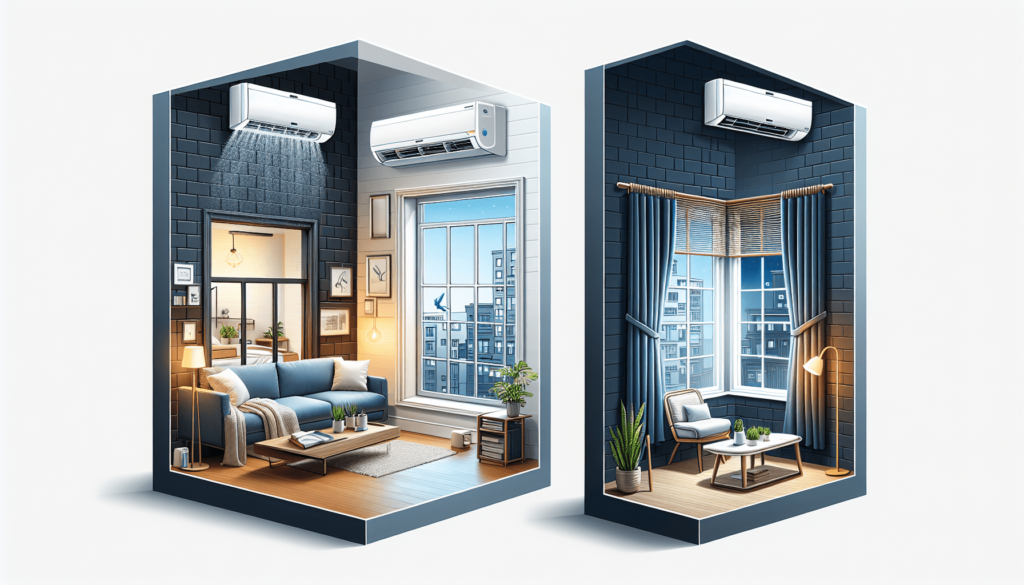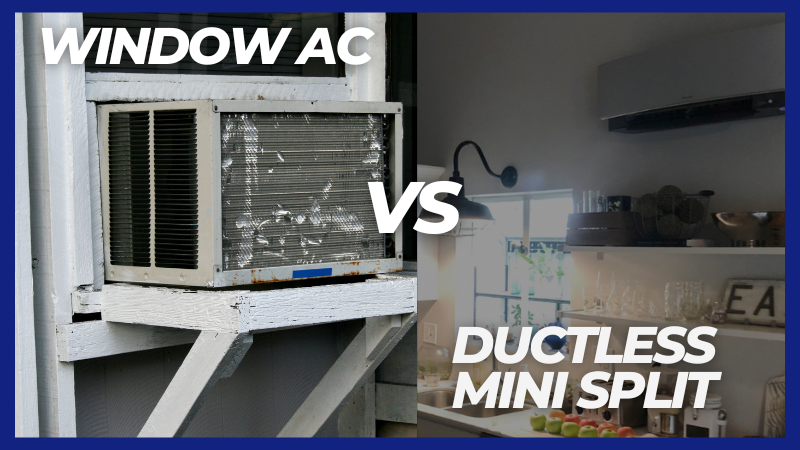Are Mini Splits Better Than Window Units

Are you sweating through the summer or shivering in the winter, even with your window AC unit or struggling with inconsistent temperatures across different rooms? This is a common problem for many homeowners, especially those relying on traditional heating and cooling solutions. Before you resign yourself to discomfort or racking up exorbitant energy bills, let's explore whether a mini-split system might be a better fit for your needs.
This guide will walk you through a practical comparison of mini-splits and window units, helping you diagnose the performance of your current setup and determine if an upgrade is warranted. We'll cover simple DIY checks you can perform, as well as when it's crucial to call in the professionals.
Diagnosing Your Current Heating/Cooling Issues
Let's start by pinpointing the root cause of your heating and cooling woes. Here's a systematic approach:
Step 1: Identify the Symptoms
Carefully observe the specific problems you're experiencing. Ask yourself the following questions:
- Is the room temperature inconsistent? Are some areas too hot or cold compared to others?
- Is the unit struggling to maintain the set temperature? Does it run constantly without reaching the desired coolness or warmth?
- Are your energy bills unusually high? Have you noticed a significant increase compared to previous periods with similar weather conditions?
- Is the unit noisy or emitting unusual odors? Loud rattling, buzzing, or strange smells can indicate mechanical issues.
- Is there visible frost or ice buildup on the unit? This could point to refrigerant problems or airflow restrictions.
- Does the unit cycle on and off frequently (short cycling)? This can be a sign of an undersized unit or a compressor problem.
Write down your observations. The more detailed you are, the easier it will be to identify the underlying cause and find the right solution.
Step 2: Simple DIY Checks (No Tools Required)
Before reaching for the toolbox, let's start with some basic visual inspections and adjustments:
- Check the air filter. A dirty air filter is the most common culprit behind poor performance. A clogged filter restricts airflow, forcing the unit to work harder and reducing its efficiency. Remove the filter and hold it up to the light. If you can't see through it easily, it's time to clean or replace it. Most window units and mini-splits have easily accessible filters.
- Ensure proper window sealing (for window units). Gaps around the unit allow conditioned air to escape and outside air to enter, negating the unit's efforts. Inspect the foam or weather stripping around the unit. Replace any damaged or missing pieces. Use caulk to seal any remaining gaps between the unit and the window frame.
- Clear obstructions around the unit. Make sure furniture, curtains, or other objects aren't blocking the airflow from the unit. Ensure there is ample space around the indoor and outdoor components for proper ventilation.
- Check the thermostat settings. Ensure the thermostat is set to the desired temperature and the correct mode (cool or heat). Verify that the thermostat is functioning correctly. Try adjusting the temperature setting and observe if the unit responds accordingly.
Step 3: DIY Checks with Basic Equipment (Requires Minimal Tools)
If the simple checks didn't resolve the issue, you can proceed with some slightly more advanced troubleshooting, requiring minimal tools like a screwdriver and a multimeter (optional):
- Inspect the condenser coils (for window units). The condenser coils are located on the outside of the unit. They dissipate heat and can become clogged with dirt and debris. Use a brush or vacuum cleaner with a brush attachment to gently clean the coils. Be careful not to damage the delicate fins.
- Check the power cord and electrical connections. Ensure the power cord is securely plugged into the outlet and that there are no signs of damage. Inspect the electrical connections inside the unit (after disconnecting the power!) for any loose wires or corrosion. Tighten any loose connections with a screwdriver. Caution: Working with electricity can be dangerous. If you're not comfortable with this step, skip it and consult a qualified electrician.
- Test the capacitor (optional, requires a multimeter). The capacitor is a small cylindrical component that helps start the compressor motor. A faulty capacitor can cause the unit to run inefficiently or not start at all. Important: Capacitors can store an electrical charge even after the unit is disconnected from the power. Discharge the capacitor before testing it by shorting the terminals with an insulated screwdriver. Use a multimeter to test the capacitance. If the reading is significantly lower than the rated capacitance, the capacitor needs to be replaced. Caution: This step requires knowledge of electrical testing procedures and should only be performed by someone comfortable working with electricity.
Step 4: When to Call a Professional
Certain issues are beyond the scope of DIY repairs and require the expertise of a qualified HVAC technician. Here are some red flags:
- Refrigerant leaks. If you suspect a refrigerant leak (e.g., hissing sound, oily residue, ice buildup), do not attempt to repair it yourself. Refrigerant handling requires specialized equipment and training.
- Compressor problems. The compressor is the heart of the cooling system. If it's making unusual noises or failing to start, it's best left to the professionals.
- Electrical issues. Any significant electrical problems beyond loose connections should be handled by a qualified electrician.
- Complex mechanical problems. If you've exhausted the DIY checks and the unit still isn't functioning properly, it's time to call for professional help.
- Unit is still under warranty. Attempting repairs yourself may void the warranty.
Mini-Splits vs. Window Units: A Comparative Analysis
Now that you've assessed your current situation, let's compare mini-splits and window units to determine which is the better option for your needs.
Window Units:
- Pros:
- Lower upfront cost. Window units are significantly cheaper to purchase than mini-split systems.
- Easy installation. Window units are relatively easy to install and require no permanent modifications to your home (other than the window opening).
- Portability. Window units can be easily moved from room to room.
- Cons:
- Lower energy efficiency. Window units are generally less energy efficient than mini-splits, leading to higher energy bills.
- Noise. Window units can be quite noisy, especially older models.
- Limited cooling/heating capacity. Window units are typically designed to cool or heat a single room.
- Window obstruction. Window units block a portion of your window, reducing natural light and ventilation.
- Security risk. Poorly installed window units can be a security risk, making it easier for intruders to enter your home.
Mini-Splits:
- Pros:
- Higher energy efficiency. Mini-splits are significantly more energy efficient than window units, resulting in lower energy bills.
- Quieter operation. Mini-splits operate much more quietly than window units, providing a more comfortable living environment.
- Zoned cooling/heating. Mini-splits allow you to control the temperature in individual rooms or zones, improving comfort and energy efficiency.
- No window obstruction. Mini-splits don't block any windows, preserving natural light and ventilation.
- Improved security. Mini-splits don't create a security risk like window units.
- Heating and Cooling. Many models offer both heating and cooling.
- Cons:
- Higher upfront cost. Mini-splits are more expensive to purchase and install than window units.
- Professional installation required. Mini-splits require professional installation, adding to the overall cost.
- Aesthetic considerations. The indoor unit of a mini-split is mounted on the wall, which may not appeal to everyone's aesthetic preferences.
Making the Decision: Is a Mini-Split Right for You?
Based on the above comparison, consider the following factors when deciding whether to switch to a mini-split system:
- Your budget. If you're on a tight budget, a window unit may be the only feasible option. However, factor in the long-term energy savings of a mini-split when making your decision.
- The size and layout of your home. If you need to cool or heat multiple rooms, a mini-split system is a more efficient and cost-effective solution.
- Your energy usage patterns. If you frequently use your AC or heater, a mini-split will likely save you money on your energy bills in the long run.
- Your comfort preferences. If you value quiet operation and zoned cooling/heating, a mini-split is the better choice.
- Installation requirements. Mini-splits require professional installation, so factor in the cost and complexity of the installation process.
In conclusion, while window units offer an affordable and convenient solution for cooling or heating a single room, mini-split systems provide superior energy efficiency, comfort, and flexibility for whole-house or multi-room applications. Carefully weigh the pros and cons of each option based on your specific needs and budget to make an informed decision.
Remember: If you're unsure about any aspect of your heating and cooling system, it's always best to consult with a qualified HVAC professional. They can assess your specific needs and recommend the best solution for your home.










